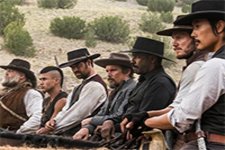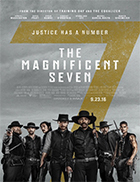The Magnificent Seven (2016)
 | The Magnificent Seven |
|  Antoine Fuqua’s The Magnificent Seven is a remake of John Sturges’s 1960 Western of the same title, which itself was an Americanized version of Akira Kurosawa’s Japanese epic Seven Samurai (1954), which in turn was modeled on American Westerns (got all that?)., Scripted by Richard Wenk (The Equalizer) and Nic Pizzolatto (True Detective), Fuqua’s version adds some tweaks and twists, but follows the basic formula of a victimized, largely defenseless group seeking out hired guns to protect them from a much better equipped group that is exploiting them. In both Kurosawa’s and Sturges’s films, rural villagers were being oppressed by a marauding gang that would show up from time to time to steal their food and provisions; Fuqua’s film, which is set roughly a decade after the Civil War, turns the villains from roaming outlaws into established, cutthroat capitalists who want to steal land out from under an established town of farmers in New Mexico in order to mine it for silver. This is not a new idea—it was the core of Clint Eastwood’s Pale Rider (1985), for instance—but it gives the formula a more modern feel that makes it even easier to identify with the victims. Antoine Fuqua’s The Magnificent Seven is a remake of John Sturges’s 1960 Western of the same title, which itself was an Americanized version of Akira Kurosawa’s Japanese epic Seven Samurai (1954), which in turn was modeled on American Westerns (got all that?)., Scripted by Richard Wenk (The Equalizer) and Nic Pizzolatto (True Detective), Fuqua’s version adds some tweaks and twists, but follows the basic formula of a victimized, largely defenseless group seeking out hired guns to protect them from a much better equipped group that is exploiting them. In both Kurosawa’s and Sturges’s films, rural villagers were being oppressed by a marauding gang that would show up from time to time to steal their food and provisions; Fuqua’s film, which is set roughly a decade after the Civil War, turns the villains from roaming outlaws into established, cutthroat capitalists who want to steal land out from under an established town of farmers in New Mexico in order to mine it for silver. This is not a new idea—it was the core of Clint Eastwood’s Pale Rider (1985), for instance—but it gives the formula a more modern feel that makes it even easier to identify with the victims.Like the films on which it is based, this version of The Magnificient Seven begins by establishing the sheer, indefensible wickedness of the villains and the outright desperation of the victims. We first meet the townspeople of Rose Creek as they huddle in their church debating what to do about the threat of Bartholomew Bogue (Peter Sarsgaard), a powerful industrialist who is making a do-or-die offer to buy their land for a fraction of its worth. Bogue conveniently shows up in the middle of the meeting with his small army of gunslingers and declares his intentions, after which his men gun down several of the townspeople in cold blood and then set the church on fire. Emma Cullen (Haley Bennett), the young widow of one of the murdered men, seeks out Chisolm (Denzel Washington, in his third collaboration with Fuqua), a well-regarded bounty hunter—or, as he puts it, “duly sworn warrant officer”—to put together a group to protect Rose Creek. It’s an “impossible” job, as Chisolm later puts it, but he’s willing to take it on, not so much for the money the townspeople offer, but because he still holds on to some vestiges of decency and honor (not surprisingly, he also has, as is revealed late in ths film, a personal grudge against Bogue). He rightly recognizes that Emma and the others are looking for revenge, but only because there is nothing left to arise from the ashes justice that, like the church, has pretty much been burned to the ground. Chisolm then goes about assembling the group that will comprise the tituar septet (the “motley seven” would be a better descriptor), starting with Josh Faraday (Chris Pratt), a wise-cracking gunslinger and gambler who joins largely because he is in Chisolm’s debt and needs his horse back (after Guardians of the Galaxy and Jurassic World, Pratt has perfected the art of the big blockbuster riposte, of which he has many here). Other men joining include Goodnight Robicheaux (Ethan Hawke), a Southern gentleman sharpshooter and Billy Rocks (Byung-hun Lee), his Chinese partner who is an expert with blades; Jack Horne (Vincent D’Onofrio), a soft-spoken, but bearishly huge tracker who looks not unlike Orson Welles in his later years; Vasquez (Manuel Garcia-Rulfo), a Mexican oulaw on whom Chisolm holds a warrant; and Red Harvest (Martin Sensmeier), a Comanche warrior who is particularly disgusted by another Native American who works for Bogue. The stage now set, the hired guns set about trying to train the hapless townspeople in the art of battle, something for which they are humorously ill-equipped (their terrible shooting leads to one of Faraday’s quips about how, statistically speaking, they should have hit something, a curiously academic joke given that in the prior scene he confessed to not knowing what a syllable is). Like the previous films, a good chunk of The Magnificent Seven focuses strategizing the fight against Bogue and his men, which is all but assured when Chisolm and company ride into town and kill all of the men Bogue has stationed there. The lead-up and eventual battle is reminiscent not of any Westerns, but rather the last act of Steven Spielberg’s Saving Private Ryan (1998), in which a small group of American soldiers attempt to defend a bridge against an oncoming group of German soldiers and tanks. Like that film, the numbers are heavily in favor of the villains (Bogue rides in with a literal army), but the townspeople under Chisolm and his men’s guidance assemble a clever series of traps and maneuvers, many of which involve copious amounts of dynamite, that will take out large numbers of Bogue’s men while funneling the rest into the center of town. At this point, The Magnificent Seven becomes an all-out war film, with massive explosions, thousands and thousands of rounds of ammunition being spent (a Gatling gun makes an appearance midway through), and what feels like hundreds of bodies hitting the dusty ground. It is not surprising to see the film take this turn, as it distinguishes it from its predecessors via sheer intensification, something that is typical of Fuqua’s films, whether they be gritty crime dramas (2001’s Training Day), medieval epics (2004’s King Arthur), or absurdist action thrillers (2013’s Olympus Has Fallen). The carnage is quite breathtaking in its own way, and it stands as testament to the MPAA ratings board’s willingness to allow any level of bloodshed under the PG-13 umbrella as long as we don’t see too much blood. The violence is, unlike Spielberg’s war film, pure fantasy, and we are spared any gruesomeness while basking in the spectacle of bad guys going down with one bullet (or one arrow, or one tomahawk, or one axe …) while the good guys fighting through multitudinous injuries that reflect their sheer determination. The violence retains some bite simply because the characters have been generally well drawn, and Fuqua, for all his focus on bullets and mayhem, still takes the time to let us get to know and appreciate them for their virtues and limitations. Chisolm, like Yul Brenner’s Chris and Takashi Shimura’s Kambei Shimada before him, is pretty much impeachable, but that sense of moral certitude and mythical fighting ability is a requirement for the role, especially since he’s faced against Bogue, who Sarsgaard plays with such immoral viciousness that he takes on a kind of sickly quality, as if his diseased, money-grubbing soul is slowly eating away at his physical body. It is easy to cheer for the underdogs and hiss at the villains, and The Magnificent Seven makes no bones about playing to those easy sentiments for rousing good-vs-evil theatrics. Copyright ©2016 James Kendrick Thoughts? E-mail James Kendrick All images copyright © MGM |
Overall Rating: 

 (3)
(3)

